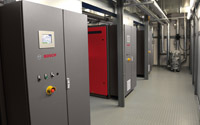

The Chancellor’s decision to exempt Combined Heat and Power (CHP) from the “carbon floor price” as part of the 2014 Budget review has been welcomed by a commercial and industrial heating manufacturer.
Geoff Hobbs, business development director at Bosch Commercial and Industrial Heating, claims that the announcement could lead to a surge in demand for the technology.
“The government’s announcement that CHP will be exempt from carbon tax from 1 April, 2015 means it has never been more prevalent for industrial users to take a look at how CHP can help to reduce carbon emissions,” he said. “This, combined with a growing list of other financial incentives, has positioned CHP as one of the most cost-effective solutions available to reduce the UK’s carbon usage.
“The fact that CHP essentially allows stakeholders to use heat created as a by-product of electricity generation means less gas is required than a comparable utility and boiler solution. Naturally, this is viewed favourably by the government’s low carbon initiatives.
“In addition to this carbon floor price exemption, there are also a host of financial incentives which can be gained from the investment in CHP technology. Not only is good quality CHP exempt from the Climate Change Levy, but it is also covered by the Enhanced Capital Allowances scheme, helping to significantly reduce payback periods.”
Mr Hobbs reminds stakeholders that it is not enough just to invest in CHP technology to realise these benefits, but correct system design is needed to maximise performance. “As with many aspects of system design, the work put in at the early stages of a project is vital to the success of any installation,” he said. “Correct sizing of a CHP system is essential to ensure the right balance between providing useful heat and electricity is maintained, and this ultimately leads to the maximum amount of savings which can be made.”